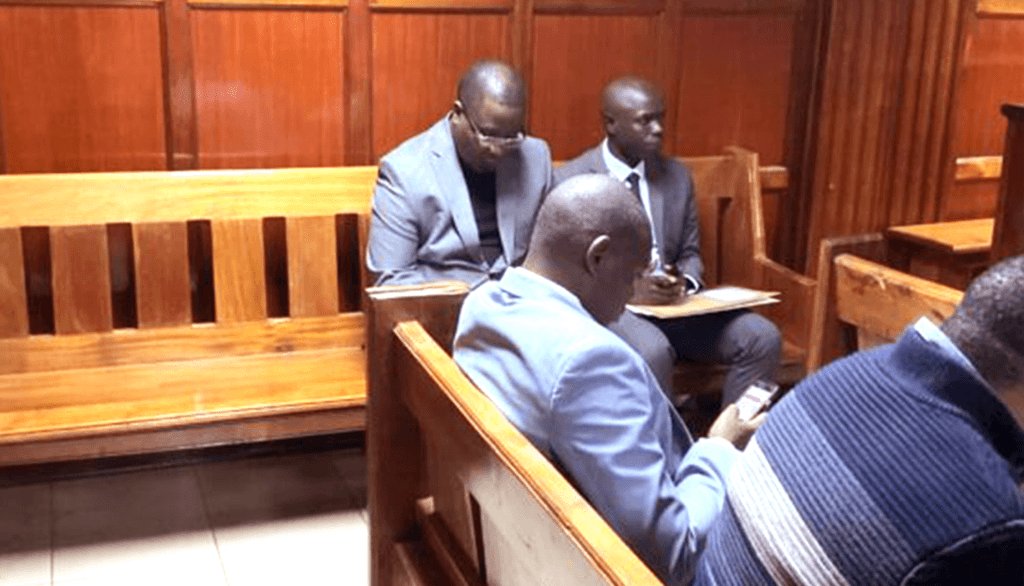Michael Njenga Waweru and Juma Luande Mudogo
The Accused: Michael Njenga Waweru and Juma Luande Mudogo, Land fraud has long been a thorn in Kenya’s real estate sector, with numerous cases highlighting the lengths to which individuals will go to unlawfully acquire property. A recent case has brought this issue to the forefront once again, involving two businessmen accused of defrauding a property owner in Nairobi’s upscale Westlands area.
On [specific date], businessmen Michael Njenga Waweru and Juma Luande Mudogo appeared before Milimani Magistrate Susan Shitubi to face charges related to a land fraud scheme valued at Sh200 million. Both individuals pleaded not guilty to the accusations leveled against them.

The prosecution alleges that Waweru and Mudogo conspired to defraud Ms. Jane Wairimu Mwangi of her parcel of land located in the Westlands area, measuring approximately 0.2020 hectares. The land is reportedly valued at Sh200 million. The two businessmen are accused of falsely claiming that they had been allocated the land by the Commissioner of Lands, fully aware that this claim was untrue.
The charges against Waweru and Mudogo are multifaceted:
Conspiracy to Defraud: The duo allegedly conspired to defraud Ms. Mwangi of her Westlands property by falsely asserting that they had been allocated the land by the Commissioner of Lands.
Forgery of Allotment Letter (October 2, 2007): It is claimed that on this date, with the intent to defraud Ms. Mwangi, the accused forged a letter of allotment in favor of Waweru. This letter was purported to be a genuine document issued by the Department of Lands and signed by Onyiro Mukobe on behalf of the Commissioner of Lands.
Forgery of Renewal of Lease (October 5, 2010): The prosecution further alleges that on or around this date, the accused forged a letter titled “Allotment for Renewal of Lease” in favor of Waweru. This document was purportedly signed by F.K. Kahuho for the Commissioner of Lands.
Following their arraignment, both Waweru and Mudogo were released on a cash bail of Sh300,000 each. The court proceedings are ongoing, with the next hearing date set to further examine the evidence and testimonies related to the case.

Land fraud is not a new phenomenon in Kenya. The country’s history is replete with cases where individuals and groups have employed dubious means to acquire land, often leading to protracted legal battles and significant financial losses for the victims.
Several high-profile cases have underscored the prevalence of land fraud in Kenya:
Sh230 Million Land Fraud Case (October 2024): Two city traders were charged with conspiracy to defraud a businessman of land worth Sh230 million. The charge sheet indicated that they, along with others not before the court, forged a letter of allotment for a 3.2-acre parcel with the intent to commit fraud. The land was registered under the Bahati Development Welfare Association. The accused were released on a Sh1 million bond or an alternative bail of Sh600,000.
Sh1 Billion Nairobi Land Fraud (June 2024): Two senior land officials were arrested and charged for allegedly planning to defraud a company of prime land in Nairobi valued at Sh1 billion. The officials purportedly conspired with eight others to fraudulently transfer the land using a fake allotment letter, claiming it was issued by the National Lands Commission. The suspects were charged with making false documents and obtaining registration by pretenses.
Sh4 Billion Land Fraud in Kwale (October 2023): Two senior lands officials were charged with fraud involving a Sh4 billion land deal in Kwale County. The officials allegedly conspired to defraud the County Government of Kwale of a parcel measuring about 63,030 hectares by forging a notification of approval, purporting it to be genuine and issued by the county government.
In response to the rising cases of land fraud, various county governments have initiated measures to protect property owners:
- Kajiado County’s New Allotment Letters (August 2020): The Kajiado County lands registry launched new generation allotment letters with enhanced security features to curb land fraud. Governor Joseph Ole Lenku revealed that these new documents have eight additional security features compared to the previous versions. This move aimed to protect genuine landowners from fraudsters and address issues of double allocation. The validation process ensured that over 12,000 plot owners acquired authenticated documents.
The case involving Waweru and Mudogo underscores the legal ramifications of engaging in land fraud. If found guilty, the accused could face severe penalties, including imprisonment and substantial fines. Moreover, such cases











